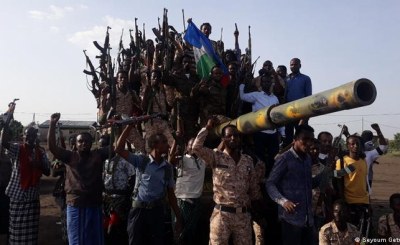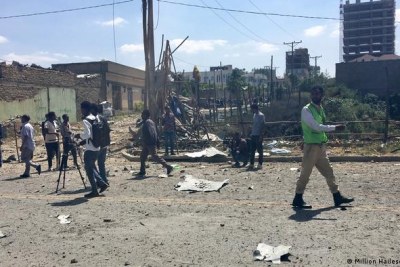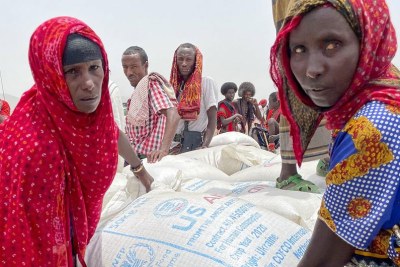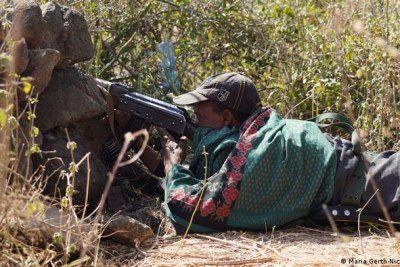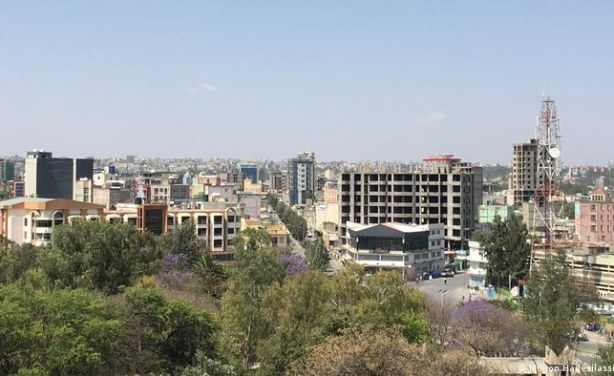-
Ethiopia: In a Raging Civil War, How Can Ethiopia Get on Track Towards Peace?
USIP, 18 October 2022
As the conflict enters its deadliest phase, U.S. leadership and collaboration with African partners are desperately needed to stop the slide. Read more »
-
Ethiopia: There is a Very Narrow Window to Prevent Genocide in Tigray, UN Health Chief Warns
UN News, 19 October 2022
The Director of the World Health Organization (WHO) urged the international community and the media on Wednesday to give the crisis in Ethiopia "the attention it deserves". Read more »
-
Ethiopia: African Union Has Failed to Silence the Guns in Tigray
The Conversation Africa, 18 October 2022
The African Union pledged in 2016 to "silence the guns" by the end of 2020, an ambitious agenda of ending armed conflicts on the continent. Just two months before that deadline,… Read more »
-
Ethiopia: Ethiopian Forces Seize Three Towns in Northern Tigray
VOA, 18 October 2022
Ethiopian government forces and their allies have captured the city of Shire and two more towns in the Tigray region in an offensive that aims to take control of airports and… Read more »
-
Ethiopia: UN Rights Chief - Fighting in Tigray Taking Toll On Civilians
VOA, 18 October 2022
The U.N. high commissioner for human rights, Volker Turk, says the escalating hostilities in Ethiopia's northern Tigray region are taking a devastating toll on the civilian… Read more »
Why Is Peace So Elusive In Ethiopia?
In August 2022 the devastating conflict in northern Ethiopia resumed - effectively ending the March 2022 humanitarian truce between the Ethiopian federal government and Tigrayan forces. Many hoped the truce would pave the way for a negotiated ceasefire and peace talks, write Ambassador Johnnie Carson and Ambassador Alex Rondos of the United States Institute of Peace (USIP).
Amid the flurry of accusations, counteraccusations, propaganda and disinformation it is hard to know how hostilities escalated and why. The latest round of fighting was preceded by weeks of steadily increasing tensions between federal and Tigrayan authorities over humanitarian aid flows, the resumption of core public services in Tigray, the structure of peace talks and alleged military provocations.
It is difficult to know if the parties to the conflict actually want a political solution, and how far were they willing to go for peace. A recent report by the International Commission of Human Rights Experts on Ethiopia and earlier reports by the Ethiopian Human Rights Commission and a joint U.N. investigation have established that war crimes and crimes against humanity occurred in the previous cycle of war. Two years of bloody hostilities have only magnified the impunity, insecurity and grievances that animated earlier mass atrocities and could drive another more catastrophic round of harm to civilians.
From the moment the war in northern Ethiopia began in November 2020 it was apparent it posed a serious threat to regional stability and U.S. interests. An October 2020 report by the United States Institute of Peace (USIP) Senior Study Group on Peace and Security in the Red Sea Arena highlighted Ethiopia's role as a U.S. partner in peacekeeping, and peace and security in the Horn of Africa more broadly. In a statement in November 2020, the Senior Study Group warned with concern that "the fragmentation of Ethiopia would be largest state collapse in modern history."
With much hanging in the balance, there is an urgent need for U.S. policymakers to take a high-level, all-hands-on-deck approach. Blinken's October 14 call for the parties to cease their escalatory conduct - including the ongoing joint offensives by the Eritrean and Ethiopian militaries - underscores the message that there is no military solution to the conflict and attempts to impose one will be rebuked. How Washington responds - and how it's perceived to be responding - to the present moment will have strategic, long-term consequences for Ethiopia, the Horn and broader U.S. interests.
USIP have made some recommendations that it believes will be helpful, following the latest escalation of violence and the risk of mass atrocities. Read here.
InFocus
-
After being blocked by security forces from meeting the media, a group of 35 local civil society organizations issued a joint statement calling for peace in Ethiopia, where the ... Read more »
-
The Tigrayan presidency has said that Eritrea has launched a "full-scale offensive" along its border with northern Ethiopia. Eritrea is bordered by Ethiopia to th Read more »
-
Diplomats have said that African Union-sponsored peace talks between Ethiopia's federal government and Tigrayan rebels - that had been planned for the weekend of October 8, 2022 - ... Read more »
-
The Ethiopian government has said it will seize control of airports and other federal facilities in the country's northern Tigray region, a day after the African Union appealed for ... Read more »



